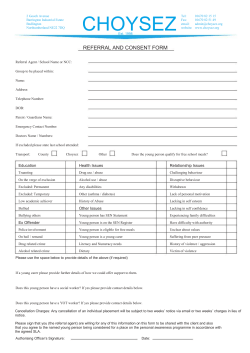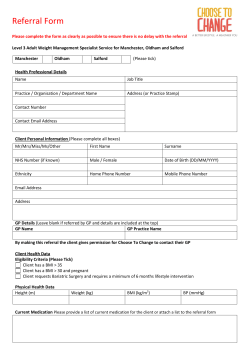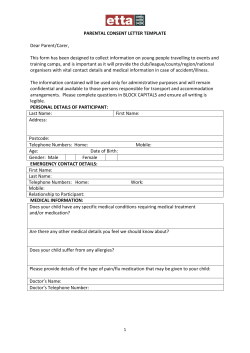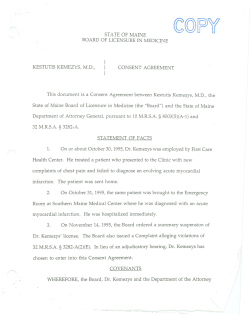
Education Template Letters for Child Advocates
Education Template Letters for Child Advocates Created by Kristin Weissinger Rocky Mountain Children’s Law Center kweissinger@childlawcenter.org How to Use These Letters These template letters are meant to be a guide to help you advocate for the educational needs of the children you represent. Some cite legal authority to support your requests. However, these letters do not constitute legal advice. For example, we have provided a template for you to request a special education evaluation, but whether requesting an evaluation is best for a particular child is up to your judgment as the child’s advocate or guardian ad litem (GAL). The law referenced in the templates is current as of April 2012. Be aware that the law does change from time to time. If you have a legal question and are not an attorney, you should collaborate with the child’s GAL and other professionals involved with the child, or reach out to CASA or other advocacy groups. Also, you can always contact our office. We encourage you to customize the letters to suit the child’s individual situation and to achieve the tone you feel is most appropriate. As a reminder, always keep a signed, dated copy of any correspondence on behalf of your children. This can be immensely helpful later on. Finally, we would love to hear whether these letters were helpful for you. Please share your experiences with us so we can improve and celebrate your children’s successes! Contents • • • • • • Request for Records o Release of information (blank) in notes Request for fee waivers (all students in out-of-home placements) Referral for Evaluation for Special Education Consent for Evaluation for Special Education o Definition of “parent” for consent purposes included to attach to letter Follow-up on referral for Evaluation (to be sent if school delays, denies, etc). o The referenced Dept. of Ed’s guidance on Response to Intervention (RTI) is attached in a separate file since it is a PDF. Letter in advance of IEP Meeting Following each letter are a notes suggesting documents to attach, quoting relevant law, etc. [DATE] Principal [NAME] [ANYTOWN SCHOOL] [ADDRESS] [ADDRESS] Re: Request for Education Records for NAME, D.O.B. ____ Dear SCHOOL Records Dept: I am the [CASA/GAL/ETC] for [STUDENT], who is currently enrolled as a [GRADE] grader in [SCHOOL]. Please fax or mail to my attention [STUDENT]’s complete educational records including, but not limited to: • • • • • • • Grades, progress reports, etc. Discipline records, including any notices sent home Evaluations and assessments, including standardized test scores and psychological or social assessments Special education records, including IEPs, BIPs, and minutes from special education meetings Pin and password for the parent/student internet information system, if any All counseling records All attendance records [SELECT ONE OF THE FOLLOWING: I have attached my order of appointment, which specifically authorizes me to access all of [STUDENT]’s educational records. The Family Educational Rights and Privacy Act (FERPA) permits release of educational records pursuant to court orders. See 20 U.S.C.A. § 1232g(b)(2)(B). [STUDENT]’s parents have received notice of the court order as they and their attorneys were present in court when the order was granted. OR I have enclosed a release signed by [STUDENT]’s parents that authorizes me to access HIS/HER records.] Thank you very much for your help. Sincerely, [YOUR NAME] [RELATIONSHIP TO CHILD] [YOUR CONTACT INFO] Attachments (1) – [Order of Appointment OR Release of Information] 4/2012 RECORDS REQUEST NOTES: • • If you do not have a court order that specifically grants you access to records, attach a Release of Information signed by the child’s parent. Here is a sample release: RELEASE OF INFORMATION I, _________________________________________________________ am the parent of the child, __________________________________________, and do hereby authorize the release of all educational records from ___________________________________________________, including by not limited to: • • • • • • • Grades, progress reports, etc. Discipline records, including any notices sent home Evaluations and assessments, including standardized test scores and psychological or social assessments Special education records, including IEPs, BIPs, and minutes from special education meetings Pin and password for the parent/student internet information system, if any All counseling records All attendance records to _____________________________________________________________________. This release may be revoked by me in writing. A photocopy of this release shall have the same force and effect as the original. This Release shall expire one year from the date of signing.. __________________________________ Name ___________________ Date __________________________________ Name ___________________ Date __________________________________ Telephone Number 4/2012 [DATE] Principal [NAME] [ANYTOWN SCHOOL] [ADDRESS] [ADDRESS] Re: Fee Waiver for [STUDENT’S NAME, D.O.B.] Dear Principal [NAME], I am writing to request a fee waiver for [STUDENT] so that [HE/SHE] may participate in [ACTIVITY/PROGRAM]. [STUDENT HAS EXPRESSED INTEREST IN JOINING/MADE THE TEAM/ETC.] but cannot pay the $[AMOUNT] required fee. According to Sec. 22-32-138(7), C.R.S. [SCHOOL/DISTRICT] must waive all fees for students in out-of-home placements, including fees for extra-curricular activities. This provision states: A school district or school in which a student in out-of-home placement is enrolled shall waive all fees that would otherwise be assessed against the student, including but not limited to any general fees, fees for books, fees for lab work, fees for participation in in-school or extracurricular activities, and fees for before-school or after-school programs. The school district or school shall not limit the opportunity of a student in out-of-home placement to participate in inschool and extracurricular activities and before-school and after-school programs due to waiver of the participation fees. [STUDENT] is currently living [IN FOSTER CARE/NAME OTHER PLACEMENT], which is in an out-of-home placement pursuant to Secs. 22-32-138(1)(e) and § 19-1-103(85), C.R.S. Accordingly, I request that you waive all fees for [STUDENT’S] participation in [ACTIVITY], including any fees for uniforms, equipment, or any other materials distributed by the school. Thank you in advance for your prompt support of [STUDENT’S] efforts to be involved in positive school activities. [CONSIDER PERSONALIZING BY INSERTING SENTENCE ABOUT WHAT THIS MEANS TO THE STUDENT/STUDENT’S DESIRE TO DO WELL IN SCHOOL/ETC.] Please feel free to contact me with any questions about this request. Sincerely, [YOUR NAME] [RELATIONSHIP TO CHILD] [YOUR CONTACT INFO] 4/2012 FEE WAIVER REQUEST NOTES: • The cited provisions that define out-of-home placement are as follows: Section 22-32-138(1)(e), C.R.S. "Student in out-of-home placement" means a child or youth who is in foster care and receiving educational services through a state-licensed day treatment facility or a child or youth who is in placement out of the home, as that term is defined in section 19-1-103 (85), C.R.S., including, but not limited to, any child or youth who is in placement outside the home as a result of an adjudication pursuant to article 2 of title 19, C.R.S. "Student in out-of-home placement" shall also include a child or youth who transfers enrollment as a result of being returned to his or her home at the conclusion of out-of-home placement. Section 19-1-103(85), C.R.S. (cross referenced in provision above) "Placement out of the home" means placement for twenty-four-hour residential care in any facility or center operated or licensed by the department of human services, but the term does not include any placement that is paid for totally by private moneys or any placement in a home for the purposes of adoption in accordance with section 19-5-205. "Placement out of the home" may be voluntary or court-ordered. "Placement out of the home" includes independent living. • Consider Attaching: If you have it, attach copies of any documents the child has shown you that state the fee and purpose (e.g. order form for a sports uniform, letter sent home regarding an art class fee). • Sign, date, and keep a copy of your letter! 4/2012 [DATE] [NAME] [ANYTOWN SCHOOL] [ADDRESS] [ADDRESS] Re: Referral for Evaluation of [STUDENT’S NAME, D.O.B.] for Special Education Dear [NAME], I am writing to refer [STUDENT] for an evaluation for [HIS/HER] eligibility for special education services. [STUDENT] is in [GRADE] grade at [SCHOOL]. I believe that [STUDENT] may have a disability because [LIST REASONS SUCH AS ACADEMIC AND FUNCTIONAL PERFORMANCE, MEDICAL INFORMATION, ETC. IF STUDENT IS PERFORMING BELOW GRADE LEVEL, SO STATE AND EXPLAIN HOW FAR BEHIND.] The following interventions have been tried: [INTERVENTIONS USED TO ADDRESS THIS STUDENT’S NEEDS]. The result of these interventions has been [RESULT]. [STUDENT] continues to struggle in school [IF APPLICABLE, NAME SPECIFIC SUBJECTS]. I believe that an evaluation is necessary to determine whether [STUDENT] has a disability and needs special education services. [IF YOU CAN:] I have attached a consent for the evaluation of [STUDENT] signed by [PARENT or NAME SURROGATE]. As you know, pursuant to 20 U.S.C. § 1414(a)(1)(c)(ii), an eligibility determination must be made within 60 days of receiving this consent. Thank you very much for your prompt attention to this matter. Please contact me if you have any questions about this request. Sincerely, [YOUR NAME] [RELATIONSHIP TO CHILD] [YOUR CONTACT INFO] 4/2012 NOTES ON REFERRAL FOR SPECIAL EDUCATION EVALUATION • It is somewhat unclear whether GALs and CASAs may make a referral for special education. In order to make a referral, a person has to be a parent, teacher, or work for a “public agency.” Although GALs, CASAs, and other advocates often make referrals without incident, to cover your bases you may decide to include the signature of a parent or someone from a state agency, such as the child’s caseworker. • Consider Attaching: You will need the consent of a parent or person authorized to make educational decisions in order for the evaluation to go forward. The 60-day clock does not start running until the school receives this consent. If possible, you should include the signed consent letter with the referral. o If this is impossible or will take too long, you can submit the referral on its own. The referral alone may trigger certain discipline protections for the child by making them a child “suspected” of having a disability. • Sign, date, and keep a copy of your letter! 4/2012 [DATE] [NAME] [ANYTOWN SCHOOL] [ADDRESS] [ADDRESS] Re: Consent for Evaluation of [STUDENT’S NAME, D.O.B.] for Special Education Dear [NAME], I am writing to provide my consent for an evaluation of [STUDENT] for special education services. [STUDENT] is in [GRADE] grade at [SCHOOL]. A referral for a special education evaluation was submitted by [NAME] on [DATE]. [OR: A referral for special education is attached to this letter.] [IF NOT THE BIO PARENT PROVIDING CONSENT: I am a “parent” authorized to provide consent for an evaluation under 34 C.F.R. § 300.30. EXPLAIN WHY. A copy of that provision is attached for your reference. IF APPLICABLE, ATTACH COURT ORDER APPOINTING EDUCATIONAL SURROGATE]. Sincerely, [YOUR NAME] [RELATIONSHIP TO CHILD] [YOUR CONTACT INFO] [PARENT/SURROGATE’S NAME] Parent [OR GUARDIAN] of [STUDENT] [PARENT’S CONTACT INFO] 4/2012 34 C.F.R. § 300.30 Code of Federal Regulations Currentness Title 34. Education Subtitle B. Regulations of the Offices of the Department of Education Chapter III. Office of Special Education and Rehabilitative Services, Department of Education Part 300. Assistance to States for the Education of Children with Disabilities Subpart A. General Definitions Used in This Part § 300.30 Parent. (a) Parent means-(1) A biological or adoptive parent of a child; (2) A foster parent, unless State law, regulations, or contractual obligations with a State or local entity prohibit a foster parent from acting as a parent; (3) A guardian generally authorized to act as the child's parent, or authorized to make educational decisions for the child (but not the State if the child is a ward of the State); (4) An individual acting in the place of a biological or adoptive parent (including a grandparent, stepparent, or other relative) with whom the child lives, or an individual who is legally responsible for the child's welfare; or (5) A surrogate parent who has been appointed in accordance with § 300.519 or section 639(a)(5) of the Act. (b)(1) Except as provided in paragraph (b)(2) of this section, the biological or adoptive parent, when attempting to act as the parent under this part and when more than one party is qualified under paragraph (a) of this section to act as a parent, must be presumed to be the parent for purposes of this section unless the biological or adoptive parent does not have legal authority to make educational decisions for the child. (2) If a judicial decree or order identifies a specific person or persons under paragraphs (a)(1) through (4) of this section to act as the “parent” of a child or to make educational decisions on behalf of a child, then such person or persons shall be determined to be the “parent” for purposes of this section. 4/2012 NOTES ON CONSENT FOR EVALUATION • Under subsection (a), a foster parent can be a “parent” for purposes of giving consent, but under subsection (b), a biological or adoptive parent, if there is one, trumps all others. However, notice that under subsection (b), a biological or adoptive parent only trumps if they are “attempting to act as the parent under” the IDEA. If the parent in your case is not affirmatively refusing consent but rather cannot be found to make a decision, the foster parent or other surrogate under (a) can provide the consent. • If the parent is uncooperative or missing, but has not had their parental rights terminated, you should ask the court to appoint an educational surrogate parent so that it is clear who has authority to act on behalf of the child at school. This is true even if the school is not demanding this. o Once you have this appointment, be sure to make copies of the order so you have it available whenever you need it. Even if the school has been lackadaisical in the past, they might insist on documentation in the future. • Sign, date, and keep a copy of your letter! 4/2012 [DATE] [NAME] [ANYTOWN SCHOOL] [ADDRESS] [ADDRESS] Re: Follow-Up on [DATE] Referral for Evaluation of [STUDENT’S NAME, D.O.B.] for Special Education Dear [NAME], I am writing to follow up on the referral for an evaluation of [STUDENT] for special education services. [STUDENT] is in [GRADE] grade at [SCHOOL]. A referral for a special education evaluation was submitted by [NAME] on [DATE]. [IF YOU CAN:] The referral is attached to this letter. Consent for the evaluation was provided by [NAME] on [DATE]. I understand from speaking with [NAME] at [SCHOOL] that the district has requested to delay an evaluation for [STUDENT] in order to first pursue Response to Intervention (RTI) techniques. While I and [PARENT/PERSON WHO GAVE CONSENT] are appreciative of [STUDENT’S] teacher to provide [HIM/HER] this assistance, [I/WE] still insist upon a complete evaluation of [HIS/HER] eligibility for special education. As you know, pursuant to 20 U.S.C. § 1414(a)(1)(c)(ii), an eligibility determination must be made within 60 days of receiving parental consent. Further, the Department of Education issued guidance on January 21, 2011 to make very clear that RTI may not be used to delay or deny evaluation of a child for special education. I have attached a copy of that guidance for your reference. Since the consent was received on [DATE], we anticipate that an eligibility determination will be made by [DATE 60 DAYS LATER]. Thank you very much for your assistance and prompt attention to this matter. Sincerely, [YOUR NAME] [RELATIONSHIP TO CHILD] [YOUR CONTACT INFO] 4/2012 NOTES ON FOLLOW-UP TO REFERRAL LETTER • Use this letter any time the school tells you (by words or actions) that they cannot conduct an evaluation until they have determined that RTI isn’t working. • You can also modify this letter if your request for an evaluation is denied for any other reason – just take out the references to RTI. • Consider Attaching: The guidance document, which you should attach, is included in a separate file from this document since it is a PDF file. If you have misplaced or never received that file, you can find it here: http://www.rti4success.org/pdf/RTI%20Memo_121-11r.pdf If that link doesn’t work, please email me at kweissinger@childlawcenter.org and I will send it to you. • Sign, date, and keep a copy of your letter! 4/2012 [DATE – PREF. 2 WKS PRIOR TO IEP MEETING, BUT AT LEAST 48 HRS] [NAME] [ANYTOWN SCHOOL] [ADDRESS] [ADDRESS] Re: [DATE] Upcoming IEP Meeting for [STUDENT, D.O.B.] Dear [NAME], I look forward to attending the [DATE] IEP meeting for [STUDENT]. In preparation for this meeting, I have [REVIEWED RECORDS & EVALS/SPOKEN WITH CHILD, THERAPIST, GAL, PARENTS ETC]. [DESCRIBE STUDENT’S CURRENT EDUCATIONAL AND FUNCTIONAL PERFORMANCE, MINDFUL OF CONFIDENTIALITY] [IF APPLICABLE, DESCRIBE ANY PROBLEMS OTHER THAN THE DISABILITY –e.g. INATTENTION, BULLYING, HYGIENE, TRANSPORTATION - THAT “are interfering with HIS/HER ability to access special education.”] I believe that in order for [STUDENT] to receive an appropriate education, [HE/SHE] needs [A CERTAIN PLACEMENT? CERTAIN SPECIAL EDUCATION SERVICES?]. This is appropriate because [WHY?]. In addition, because [NAME PROBLEM FROM ¶3 ABOVE] is substantially interfering with [STUDENT’S] ability to benefit from special education, [SERVICE] is a necessary related service. Since STUDENT is [AGE, 14 OR OLDER], transitional goals and services should also be included in [HIS/HER] IEP. Based on [STUDENT’S] interests and abilities, I recommend that [NAME VOCATIONAL PROGRAM/JOB READINESS SERVICES, ETC] be included in [HIS/HER] IEP. If you prepare a draft IEP in advance of the meeting, please send me a copy by [SELECT DATE 2-5 BUSINESS DAYS PRIOR TO MEETING] so I have an opportunity to review the draft. Also, if there have been any evaluations progress reports after [DATE OF YOUR LAST RECORDS RECIEPT], please send those to me as well. You can send these to me at [EMAIL or FAX]. I appreciate your efforts to help [STUDENT] succeed in school. Thank you in advance for your assistance. Sincerely, 4/2012 [YOUR NAME] [RELATIONSHIP TO CHILD] [YOUR CONTACT INFO] 4/2012 NOTES ON LETTER IN ADVANCE OF IEP MEETING • As is apparent from the template, the content of this letter is extremely dependent upon the child’s individual needs. Customize liberally, but keep in place key phrases such as “appropriate,” “substantially interfering with his/her ability to benefit from special education,” and “related service.” These are magic words under IDEA. • Whether to send a letter like this in advance of an IEP meeting is a strategic decision – certainly it is not necessary all the time. The main purposes of this letter are to 1) influence the draft IEP before it even gets written, and/or 2) give notice of a substantial request if you think that will make it more likely the school will agree. It may be useful in circumstances where: o you are particularly concerned about not having a voice during the meeting; o you are asking for something big that you believe the school is likely to resist, such as a one-to-one aid, extended year services, or other expensive or burdensome services or equipment; o the school has written very poor quality IEPs in the past. • Consider Attaching: If you decide to request specific services, transitional programs, etc., consider attaching supporting documentation such as: o An evaluation of the child that supports your request (or you can just quote the eval in the letter if the school already has a copy); o If applicable, information about a program or service-provider they may not be familiar with; o If available, empirical data showing that the method/service you are proposing is effective in addressing the child’s issue. • Remember, almost anything can be a “related service” if it is required for the student benefit from special education. • Be particularly intentional about your tone in this letter. • Sign, date, and keep a copy of your letter! 4/2012
© Copyright 2025





















